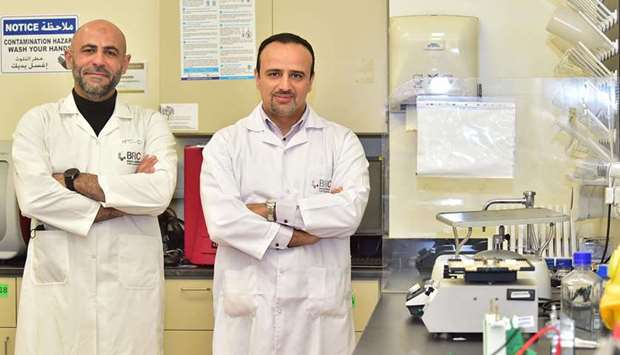Dr Mohamed Elrayess, research associate professor at the Biomedical Research Centre - Qatar University (BRC-QU), has conducted a study to help critically ill Covid-19 patients, focusing on new predictive biomarkers of length of stay in the intensive care unit (ICU) for better management and risk reduction.
“The Severe Acute Respiratory Syndrome Coronavirus 2 (Sars-CoV-2), causing the novel coronavirus disease 2019 (Covid-19) pandemic, has endangered the lives of millions around the globe. Around 20% of Covid-19 patients become critically ill as they exhibit respiratory distress that requires immediate oxygen supply, including invasive mechanical ventilation in severe cases. Out of the critically ill patients, 30% die,” QU said in a statement.
During the peak time, intensivists are required to predict the duration of invasive mechanical ventilation for a better utilisation of ICU resources using a number of laboratory values and patient features, also known as Apache score, which considers both acute and chronic disease. However, the accuracy of early clinical prediction of duration of invasive mechanical ventilation remains limited, especially in patients who require longer stay and more care.
“Therefore, one of the most challenging aspects of Covid-19 pandemic is managing critically ill patients in the ICU, especially during the disease peak time due to limited capacity and resources,” the statement notes.
Early detection of the metabolic changes in critically ill Covid-19 patients under invasive mechanical ventilation (IMV) in the intensive care unit could help in their disease management and recovery. These patients constitute the real strain on the health system and are liable to some of the worst possible outcomes of the disease, which renders early prediction of their evolution at ICU of tremendous clinical value, it explains.
In this regard, it has become “very important to identify Covid-19 patients who are likely to recover faster and predict their recovery duration for better management of resources in the ICU”.
Dr Elrayess and a research team from BRC-QU (Dr Asmaa al-Thani, Dr Hadi Yassine, Dr Fatiha Benslimane and Maria Smatti), Hamad Medical Corporation (Dr Ali Ait Hssain) and Hamad Bin Khalifa University (Sara Taleb, Dr Ilhame Diboun and Prof Omar Albagha), have investigated novel predictive biomarkers of length of stay in the ICU for the better management of ICU resources and risk reduction of Covid-19 outcomes.
The emerging novel data has identified alterations in specific clinical features between ICU admission and one week in the ICU. In addition, the data has also suggested that certain metabolic changes during the first week of admission can be utilised to predict Covid-19 ICU outcomes.
Previous reports comparing the metabolic profiling of Covid-19-infected samples and matching healthy controls have revealed a specific metabolic signature of disease severity. However, most of these studies collected metabolites after patients acquired the severe disease symptoms. Therefore, the utilisation of these models for severity prediction remains limited.
In this study, researchers have investigated whether Covid-19 can trigger specific metabolic changes detectable in the sera of patients under mechanical intubation as soon as they are admitted to the ICU in order to use them as tools to differentiate those who are likely to recover from those who would sustain an extended stay in the ICU. Therefore, targeted metabolic profiling has been conducted of the sera of critically ill Covid-19 patients in the ICU at two time points.
The first analysis was for samples collected within the first 48 hours of intubation and the second was for samples collected a week later. Researchers have also confirmed their findings in published data of metabolic markers of Covid-19 severity by other investigators. The results of the study identified a model based on two metabolites (hypoxanthine and betaine) measured at ICU admission that was best at predicting whether a patient is likely to experience a short or long stay in the ICU.
Another model based on five metabolites (kynurenine, 3-methylhistidine, Ornithine, p-Cresol sulfate and C24.0 sphingomyelin), measured a week after ICU admission, was identified to accurately predict the invasive mechanical ventilation. Both predictive models outperformed the gold standard Apache II score used in ICUs all over the world and differentiated Covid-19 severity in published data.
In summary, the findings of the study have shown that it is possible to discriminate on admission the critically ill Covid-19 patients who are likely to stay shorter from those who are likely to experience a long stay in the ICU. The biomarkers that have been identified and patented are associated with various medical complications of Covid-19 infection such as inflammation, coagulation, kidney injuries and immune response.
The identified models outperformed the predictive ability of the gold standard Apache II score, which is typically used for predicting fatality and disease severity. The identified predictive biomarkers may also be used as therapeutic targets for intervention to improve the patient clinical profile in the ICU.
Validation of the utility of the panel of biomarkers for predicting duration at ICU and IMV is currently under way in preparation for its wider use in Qatar and around the world.

Dr Mohamed Elrayess and a researcher from the Biomedical Research Centre at QU.
